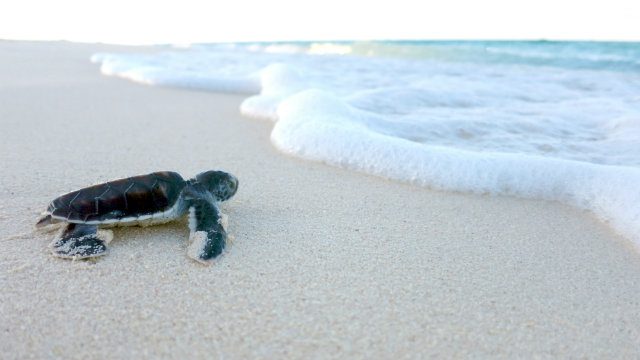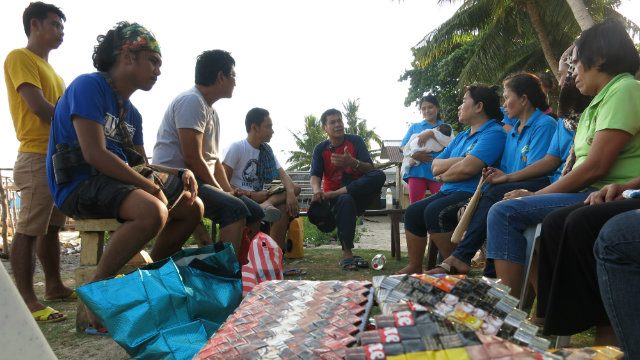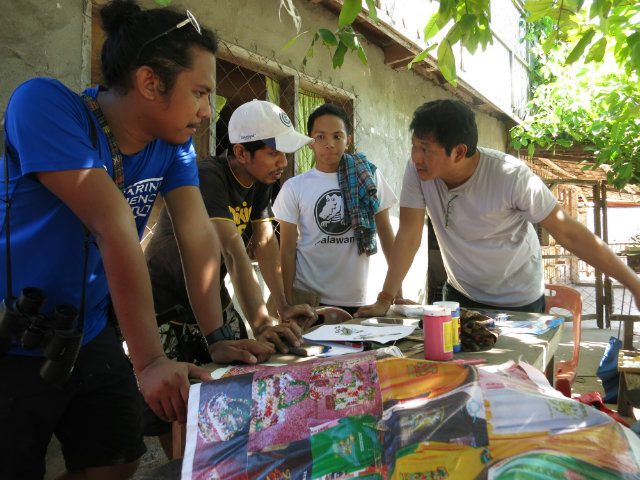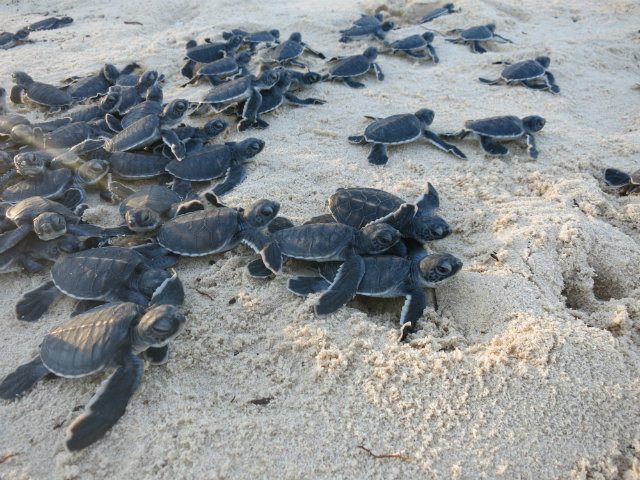SUMMARY
This is AI generated summarization, which may have errors. For context, always refer to the full article.

MANILA, Philippines – Beach trash in the Turtle Islands Wildlife Sanctuary (TIWS) in Tawi-Tawi are being turned into eco-friendly purses
The simple act, done by the Taganak Women Buyers’ Club, can help protect the threatened green sea turtles.
“Plastic garbage, especially sando bags, has been a big problem for our community since they were introduced here,” said Enelita Bungay, the club’s president. Aside from lacking trash bins and materials recovery facilities, most residents lack knowledge on proper waste disposal.
The women collect plastic sachets along the coastline of Taganak and use them to make wallets and purses, using a pattern called kupin-kupin, an Igorot term which means “fold-fold.” They also convert recycled plastic shopping bags into turtle-shaped keychains.
The women’s alternative livelihood helps nesting turtles that climb up the beach of Taganak find a clean and safe place to lay their eggs. It also reduces the chances of turtles dying from accidentally eating plastic.
Coral Triangle’s threatened treasure
Taganak has the largest land area and population among TIWS’ 7 islands. A UNESCO World Heritage site, TIWS is known as the only major nesting ground of green sea turtles in the whole ASEAN Region.
Together with the Sabah Turtle Islands in Malaysia, they have been declared as the Turtle Islands Heritage Protected Area – the first transfrontier protected area for marine turtles in the world.
“The green sea turtles are creatures that graze on seagrass meadows, keeping them healthy and productive. Sadly, they are also highly threatened,” said Raul Roldan, country deputy team leader of the Coastal and Marine Resources Management in the Coral Triangle (CTI-SEA), a project funded by the Asian Development Bank and the Global Environment Facility.
Large-scale illegal harvest and trade of turtle eggs, coastal erosion, and the dumping of garbage along shorelines reduce the turtles’ chances for survival. Residents traditionally collect, sell, and eat turtle eggs but these are illegal under the Wildlife Act of 2001.
“We have to give them options aside from egg poaching and fishing,” said Roldan. “Fish catch in the area is dwindling and it is not easy to make people give up traditional practice.”
Win-win solutions

To help address such problems, CTI-SEA has been working in TIWS with government and non-governmental organizations partners in providing alternative livelihood among people’s organizations (POs). This can help POs earn, harness their creativity and business skills, and at the same time, conserve the turtles.
The beneficiaries are the FRIENDS Youth Club and the Taganak Women Buyers Club, which were organized under an earlier Coral Triangle project.
Starting October 2014, CTI-SEA has been giving the two groups supplies for their t-shirt project and bag, wallet making, and keychain project, respectively. Both POs are based in Taganak.
“Few items reach our place so we cannot expect what month we can order again to replenish our stocks,” Bungay. “People want to buy but we cannot give them anything because we have such small capitals. We are always of short supply,” she added.
As of July 2015, the FRIENDS youth club has recovered the principal of P10,000 in two months. They also managed to roll it over to expand the business.
On the other hand, the women’s club received an additional interest-free loan of P60,000 payable in 6 months. The recovered principal will be distributed to other members who can use it to expand their bag-making business or venture into other small enterprises.
Not just souvenirs

Bela Clemente from the Turtle Conservation Society of the Philippines and the NGO LAHAT taught women how to create the bags in 2009. Since then, Taganak Women Buyers Club has been regularly selling products to LAHAT, which then sends it to resellers and big Manila-based companies as corporate giveaways.
“I always tell the women in Turtle that we want their products to be conversation pieces and not just practical items,” said Clemente. “When I give some to other people, I make sure that I talk about it right away as a way of enlightening them. That’s really just one of the ways to help our environment: talk about it.”
Marsha Liza Timbang, a member of one of the POs, said the alternative livelihood has helped support their family’s expenses. “Making the products really helps our family since my husband does not have a job and we have our baby to worry about,” she said.
CTI-SEA will also conduct an organic farming training in Taganak Island with LAHAT that will be piloted in a local school this year to help provide nutritious food for the residents. A hands-on training on solid waste management and installation of materials recovery facility are also lined up.
Climate change, turtles

Aside from the alternative livelihood projects, CTI-SEA is working with development partners in setting up a network of protected areas in the sea turtle corridor spanning Indonesia, Malaysia, and the Philippines.
The project is also addressing the impacts of climate change on green sea turtles.
The sex of turtle hatchlings is determined by the temperature of the nest. Hence, rising temperatures due to climate change will result in warmer nests and the birth of more female than male turtles.
Coastal erosion forces the turtles to nest further up the shore, where vegetation makes it harder for them to create 1-meter deep nests. This was an issue raised during the recent Protected Area Management Board meeting held in July 2015. CTI-SEA will consult with partners and concerned government agencies to identify actions to mitigate shoreline erosion.
The project will likewise assist in updating the general management plan of TIWS by sharing the vulnerability assessment that results and hazard maps developed from a survey of 5 inhabited islands in 2014. – Rappler.com
Lourdes Margarita Caballero is a development communicator and serves as the Knowledge Management Specialist of the CTI-SEA project.
CTI-SEA is a regional non-profit project funded by the Asian Development Bank and the Global Environmental Facility. It aims for climate resilience among coastal communities in Malaysia, Indonesia, and the Philippines.
Add a comment
How does this make you feel?
There are no comments yet. Add your comment to start the conversation.